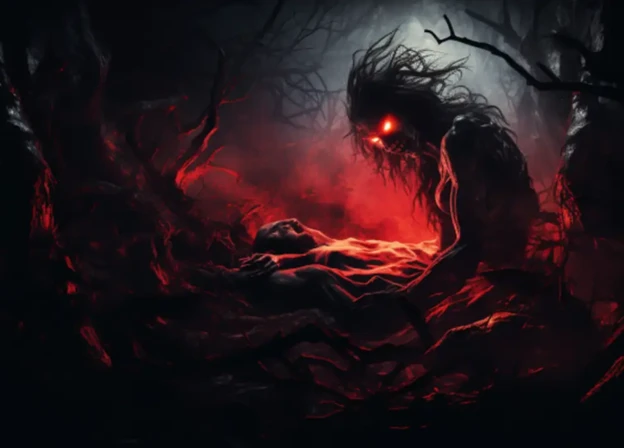Can you feel the dark tendrils of a dream creeping into your thoughts? Those vivid and haunting visions of the devil that leave you questioning their meaning and significance. While dreams about the devil may be unsettling, they hold a deep symbolism that begs to be unraveled. The devil, a figure steeped in centuries of mythology and religious beliefs, represents the archetype of evil, the temptation and sin that plagues humanity, and the hidden aspects of our own shadow selves. In this article, we will delve into the complex interpretations of dreams featuring the devil, exploring the personal, psychological, and cultural influences that shape these nocturnal encounters. Join us as we shed light on the enigmatic world of devil dreams and uncover their hidden messages.
The Symbolism of the Devil
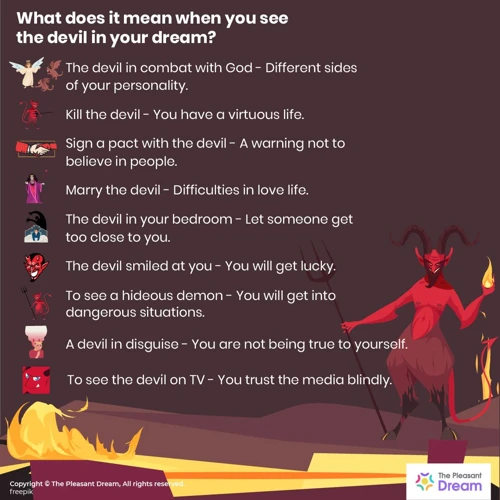
Deep within the realms of human consciousness, the devil emerges as a complex and multifaceted symbol. This archetype of evil pervades numerous cultural and religious traditions, embodying a force that defies conventional morality. The devil represents the embodiment of temptation and sin, luring individuals towards their forbidden desires and leading them astray from virtue. In psychological terms, the devil also serves as a manifestation of the shadow self, the darker aspects hidden within our own psyche that we may be reluctant to acknowledge and confront. Dreams featuring the devil often serve as a reflection of these symbolic representations, offering glimpses into our deepest fears, desires, and repressed emotions. As we unravel the meaning behind these dreams, we begin to unravel the depths of our own consciousness, exploring the intricate interplay of light and darkness within our souls. To understand the profound symbolism embedded within dreams of the devil, we must delve into the personal, psychological, and cultural influences that shape our nocturnal encounters, unveiling the hidden messages they carry.
The Archetype of Evil
The devil, as an archetype of evil, embodies the darkness that resides within human consciousness and the collective unconscious. This symbolic figure represents the embodiment of malevolence, corruption, and temptation. In dreams, encountering the devil can be a reflection of our own inner struggles with morality and the choices we make in our waking lives. The devil serves as a reminder of the potential for wickedness and the constant battle between good and evil within us. Exploring dreams involving the archetype of evil can provide insight into our personal experiences with temptation and the moral dilemmas we face. It invites us to confront our own shadow selves and contemplate the nature of morality, guiding us towards self-reflection and introspection.
The Temptation and Sin
The devil’s association with temptation and sin is deeply ingrained within our collective consciousness. In dreams featuring the devil, this theme often manifests as a metaphor for the internal struggles we face when confronted with moral dilemmas and forbidden desires. The devil becomes a symbol of the allure and seduction that draws us towards actions and choices that may go against our better judgment. It is in these dreams that we are forced to confront our own inner conflicts, wrestling with the complexities of right and wrong, and ultimately facing the consequences of our decisions. Whether it is resisting the temptation to make a questionable deal, succumbing to vices that we know are harmful, or feeling the weight of guilt for past actions, dreams of the devil provoke a deep introspection and contemplation of our own morality and ethical values.
The Shadow Self
The concept of the shadow self plays a significant role in understanding the symbolism behind dreams of the devil. The shadow self refers to the hidden, darker aspects of our personality that we often repress or deny. It represents our fears, desires, and impulses that society considers unacceptable or taboo. When the devil appears in dreams, it can be a manifestation of the shadow self, urging us to acknowledge and confront these suppressed aspects of our being. These dreams serve as a powerful reminder that embracing and integrating our shadow self is crucial for personal growth and self-awareness. By acknowledging and addressing these hidden parts of ourselves, we can achieve a sense of wholeness and harmony within. Explore your dreams of being trapped, dreaming of maggots, or even the biblical meaning of a cheque in a dream to further understand the intricacies of the shadow self and its connection to the realm of dreams.
Interpreting Dreams of the Devil
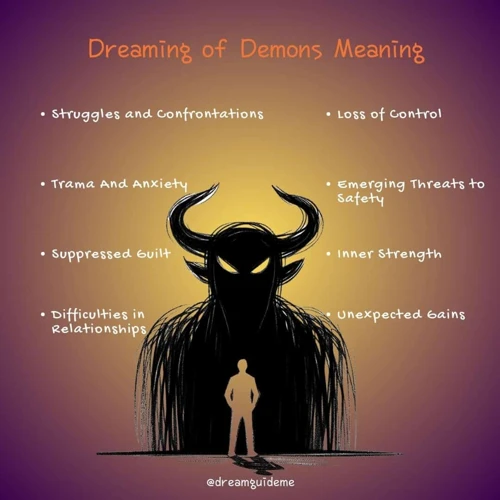
Interpreting dreams of the devil requires careful consideration of various factors that contribute to their symbolic meaning. Symbols associated with the devil can differ based on personal beliefs, cultural influences, and emotional context. One way to understand these dreams is through symbolic representations. The devil may represent temptation, inner turmoil, or a warning against destructive behavior. Personal beliefs and cultural influences also play a significant role. Religious backgrounds and mythological references shape interpretations, as well as superstitions and taboos. Additionally, emotional context provides valuable insights into the dream’s meaning. Fear, guilt, or a sense of being out of control may be present in these dreams and offer clues to their interpretation. By examining the intricate layers of symbolism, belief systems, and emotional context, we can unlock the hidden messages within dreams of the devil.
Symbolic Representations
When it comes to dreams about the devil, symbolic representations play a crucial role in interpreting their meaning. The devil is often seen as a representation of temptation, evil, and the dark aspects of human nature. In dreams, the devil may symbolize our own inner conflicts, hidden desires, and fears. It can be a reflection of the struggles we face in our waking lives, the choices we must make between right and wrong, and the consequences of our actions. The presence of the devil in dreams invites us to explore our own moral compass and confront the complexities of our desires and choices. By understanding the symbolic representations within these dreams, we can gain insight into our deeper selves and navigate the intricate landscape of our own subconscious minds.
Personal Beliefs and Cultural Influences
– Personal Beliefs and Cultural Influences play a significant role in shaping the interpretation of dreams about the devil. Our individual religious or spiritual beliefs can deeply influence how we perceive the devil’s presence in our dreams. For example, someone with a Christian background may view the devil as a symbol of temptation and sin, while someone from a different cultural or religious background may have alternative interpretations. Cultural influences also play a role, as societal beliefs and folklore surrounding the devil can affect our understanding of these dreams. It is important to consider our personal beliefs and cultural context when analyzing dreams about the devil, as they can provide valuable insight into the meaning behind these nocturnal encounters.
Emotional Context
Dreams about the devil are not only shaped by personal beliefs and cultural influences but also heavily influenced by the emotional context in which they occur. The emotional context plays a significant role in how we experience and interpret these dreams. The feelings experienced during the dream, such as fear, anxiety, or even fascination, can provide important insights into the underlying message. For example, if the dream evokes a sense of terror, it may indicate deep-seated fears or anxieties in waking life that need to be addressed. Alternatively, if the dream elicits a feeling of fascination or curiosity, it could signify a desire to explore the forbidden or confront inner conflicts. Understanding the emotional context of devil dreams can offer valuable clues to unraveling their deeper meanings and significance.
Common Devil Dream Scenarios
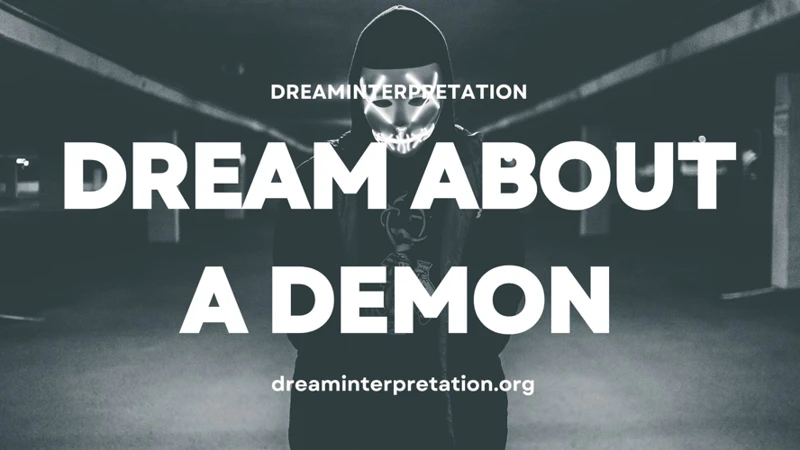
When it comes to dreams about the devil, there are a variety of common scenarios that people may experience. One frequent theme is the battle with the devil, where individuals find themselves engaged in a fierce struggle between good and evil forces. This dream can symbolize the internal conflict within oneself, as one grapples with difficult decisions or unresolved issues. Another common scenario involves making a deal with the devil, where individuals may feel tempted to trade their souls or compromise their values in pursuit of personal gain. This dream can highlight the ethical dilemmas or moral compromises one may face in waking life. Being possessed by the devil is yet another scenario that often manifests in dreams. In such dreams, individuals may feel a loss of control over their actions or behaviors, reflecting a deep-seated fear of being influenced by negative forces. Additionally, dreams featuring encounters with demons and hellish landscapes can evoke feelings of fear and unease, representing the subconscious exploration of darker aspects of the psyche or confronting unresolved traumas. Each of these scenarios presents a unique insight into the complex symbolism and psychological dynamics surrounding dreams of the devil.
Battling the Devil
When it comes to dreams of battling the devil, it is a harrowing experience that signifies a significant inner struggle. Such dreams often manifest as intense confrontations between the dreamer and the devil, representing the ongoing battle between good and evil within one’s own psyche. The dreamer is faced with the challenge of overcoming their fears, doubts, and negative impulses. These dreams can be a reflection of the internal conflicts and challenges the dreamer may be facing in their waking life. It portrays the need for the dreamer to summon their inner strength, resilience, and determination to overcome obstacles and face their deepest fears head-on. The dream serves as a powerful metaphor for personal growth and the journey towards self-mastery. It reminds the dreamer to embrace their inner light and fight against the forces that seek to corrupt and hinder their progress.
Making a Deal with the Devil
Making a deal with the devil is a common theme in folklore, literature, and in the realm of dreams. This dream scenario revolves around the notion of entering into a Faustian bargain, where an individual willingly trades their soul or makes a pact with the devil in exchange for power, wealth, or some other desired outcome. The symbolism behind this dream is often associated with the temptations and moral compromises we face in our waking lives. It represents the internal struggle between our ambitions and the potential consequences of pursuing them. Dreaming of making a deal with the devil may serve as a warning to carefully consider the ethical implications of our choices and the potential price we may pay for our desires. It urges us to reflect on our values and the long-term impact of our actions.
Being Possessed by the Devil
Being possessed by the devil is a haunting scenario that often appears in dreams, evoking feelings of fear, helplessness, and an overwhelming sense of darkness. In these dreams, individuals may experience a terrifying sensation of losing control over themselves, as if their mind and body are being taken over by a malevolent force. The symbolism behind dreams of being possessed by the devil can vary depending on the individual’s personal beliefs and cultural influences. Some interpretations suggest that this dream signifies a deep internal struggle between one’s own desires and societal expectations. It may also represent a fear of being influenced or manipulated by negative forces in one’s life. Exploring the emotional context and underlying fears associated with these dreams can offer valuable insights into the individual’s psychological state and help navigate the path towards self-discovery and empowerment.
Encountering Demons and Hellish Landscapes
Encountering Demons and Hellish Landscapes in dreams can be a truly chilling experience. These dreams often involve terrifying imagery and a sense of being trapped in a nightmarish realm. You may find yourself face to face with grotesque, demonic creatures, surrounded by a landscape that reeks of fire, brimstone, and despair. These dreams are symbolic in nature, representing our deepest fears, anxieties, and inner struggles. The demons and hellish landscapes serve as manifestations of our own inner turmoil and inner demons that we may be grappling with in waking life. They can represent feelings of guilt, shame, or a perceived threat to our well-being. These dreams may indicate the need to confront and overcome these inner challenges, to shed light on the darkness within ourselves, and emerge stronger and transformed. It’s essential to pay attention to the emotional context of these dreams and explore any underlying issues that may be plaguing us.
Psychological Perspectives on Devil Dreams
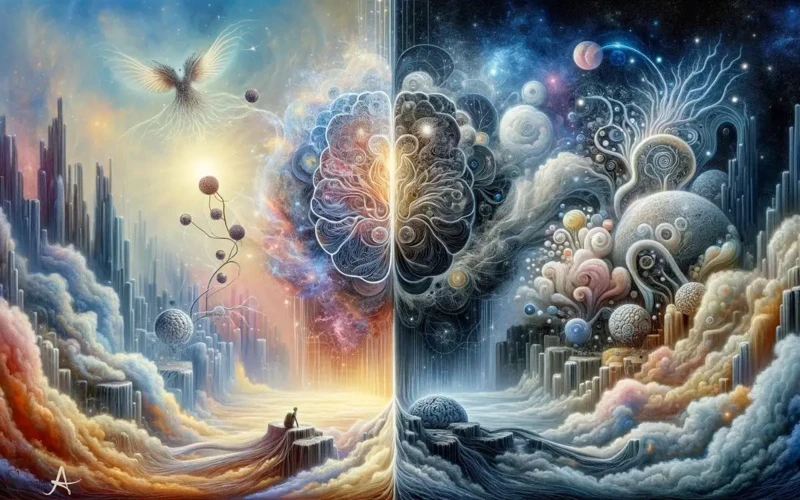
From a psychological perspective, dreams featuring the devil offer a fascinating glimpse into the depths of the human psyche. These dreams often serve as a powerful tool for confronting and unraveling our inner demons. The devil can be seen as a symbol representing the darker aspects of our personality, the hidden desires or fears that we may repress in our waking lives. When we dream of the devil, it can be a manifestation of our subconscious urging us to confront these suppressed emotions and desires. These dreams may provide an opportunity for self-reflection and exploration, allowing us to delve into our forbidden desires or fears of punishment and judgment. By examining the psychological underpinnings of our devil dreams, we open the door to understanding and integrating the shadow aspects of our personalities, ultimately leading to self-acceptance and personal growth.
Confronting Inner Demons
Dreams of the devil often serve as a powerful tool for confronting inner demons. In these dreams, the devil can be seen as a manifestation of our deepest fears, insecurities, and suppressed emotions. It is a symbolic representation of the parts of ourselves that we struggle to acknowledge or accept. By encountering the devil in our dreams, we are forced to face these inner demons head-on, bringing them to the forefront of our consciousness. This confrontation provides an opportunity for self-reflection, growth, and ultimately, transformation. Whether it be confronting a past mistake or addressing unresolved emotions, dreams of the devil prompt us to delve deep into our subconscious and confront the darker aspects of our being. By acknowledging and integrating these inner demons, we can achieve a sense of wholeness and inner peace.
Exploring Forbidden Desires
Dreams involving the devil can serve as a gateway into the realm of our hidden and forbidden desires. When we dream of succumbing to temptation or engaging in sinful acts with the devil, it often reflects our unconscious desires, fantasies, or yearnings that we may suppress or feel conflicted about in waking life. These dreams provide a safe space for us to explore and reconcile with these taboo aspects of ourselves. They may be an opportunity for self-reflection, allowing us to confront and understand the underlying motivations and emotions associated with these forbidden desires. It is important to approach these dreams with curiosity and a non-judgmental mindset, acknowledging that our dreams are a rich tapestry of complex and sometimes contradictory elements of our psyche. By analyzing and reflecting upon these dreams, we can gain insight into our deepest longings and work towards integrating them into our conscious lives in healthier and more fulfilling ways.
Fear of Punishment and Judgement
Dreams featuring the devil often evoke a deep-seated fear of punishment and judgment. The presence of the devil in such dreams may signify a subconscious unease about the consequences of our actions or a fear of divine retribution. This fear may stem from religious teachings ingrained in our belief systems, where the devil is often associated with punishment and eternal damnation. In the realm of dreams, this fear is magnified, as we are faced with the haunting image of the devil, who symbolizes the consequences of our wrongdoings. The dream may serve as a warning, urging us to reflect on our actions and make amends before it’s too late. It prompts us to confront our fears of punishment and judgment, encouraging personal growth and a reevaluation of our choices and behaviors.
Religious and Cultural Interpretations
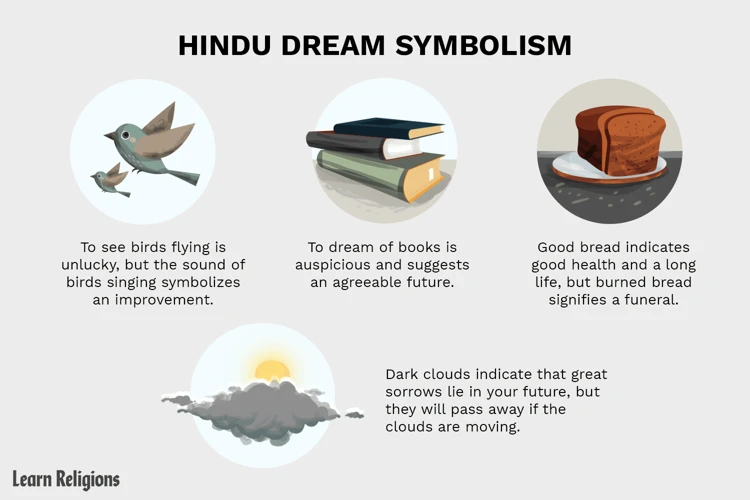
Religious and cultural interpretations play a crucial role in understanding dreams about the devil. Various religious beliefs and teachings assign specific meanings to encounters with the devil in dreams. In Christianity, for instance, the devil is often associated with temptation, evil, and spiritual warfare. Dreaming of the devil in this context may be viewed as a warning to resist sinful temptations or as a reminder of the eternal struggle between good and evil. Similarly, other religious traditions such as Islam, Judaism, and Hinduism have their own interpretations of the devil and his significance in dreams. Mythological and folklore references also contribute to the understanding of devil dreams, as they provide stories and symbols deeply ingrained in cultural narratives. Additionally, superstitions and taboos associated with the devil vary across cultures, influencing interpretations of dreams. Exploring the religious and cultural dimensions of dreams about the devil helps unravel the layers of symbolism and meaning attached to these powerful nocturnal visions.
Religious Beliefs and Teachings
Religious beliefs and teachings play a significant role in the interpretation of dreams about the devil. Different religions have varied perspectives on the devil, and these beliefs greatly influence how individuals perceive and understand such dreams. In Christianity, for example, the devil is often seen as a powerful entity who tempts humans to commit sins. Devil dreams within this religious framework may be interpreted as warnings or calls to resist temptation. Similarly, in other faiths like Islam or Judaism, the devil is seen as a malevolent being who seeks to lead individuals astray. Understanding one’s religious background and the teachings associated with the devil can provide valuable insight into the symbolism and significance of dreams featuring this enigmatic figure.
Mythological and Folklore References
Mythological and folklore references surrounding the devil provide a rich tapestry of stories and legends that contribute to the interpretation of devil dreams. Across different cultures, the devil takes on various names and forms, such as Satan, Lucifer, or Beelzebub, each with their own unique characteristics. In Greek mythology, the devil is often associated with figures like Hades or the trickster god Hermes. In Christian folklore, the devil is depicted as a fallen angel who rebelled against God. These mythological and folklore references offer additional layers of symbolism for understanding devil dreams, tapping into collective human consciousness and the universal themes of temptation, punishment, and the eternal struggle between good and evil. Exploring these narratives can shed light on the nuances and hidden messages found within dreams about the devil.
Superstitions and Taboos
Superstitions and taboos play a significant role in shaping the interpretations of dreams involving the devil. In many cultures, these dreams are seen as ominous omens or warnings of impending danger. Some beliefs suggest that dreaming of the devil signifies bad luck or the presence of evil spirits. In certain communities, it is considered taboo to speak openly about dreams featuring the devil, as it is believed that such discussions can invite negative energies. Rituals and practices are often performed to ward off the perceived malevolence associated with these dreams. These superstitions and taboos reflect the deep-rooted fears and cultural beliefs surrounding the devil, further highlighting the complexity and impact of these dream experiences.
Coping with Devil Dreams
When faced with the unsettling and perplexing nature of devil dreams, it is essential to develop coping strategies that can provide solace and understanding. Embracing the shadow self is a crucial step in navigating these dreams, acknowledging that dark and forbidden desires exist within us all. By embracing rather than repressing these aspects, we can gain a deeper understanding of ourselves and integrate these shadows into our conscious lives. Engaging in journaling and self-reflection can be immensely helpful, as it allows us to explore the emotions and thoughts that arise from these dreams. By documenting our dreams and examining recurring patterns, symbols, and themes, we can gain insights into our subconscious and begin the process of interpretation and healing. Seeking professional help from therapists or dream analysts who specialize in dream work can also provide guidance and support in unraveling the meaning behind devil dreams. Through a combination of self-exploration, reflection, and professional assistance, we can navigate the unsettling terrain of devil dreams and find meaning, growth, and peace amidst the darkness.
Embracing the Shadow Self
Embracing the shadow self is a crucial aspect in understanding and interpreting dreams of the devil. The concept of the shadow self, popularized by psychologist Carl Jung, refers to the dark and unconscious parts of our psyche that we often repress or deny. In the context of devil dreams, encountering the devil can be seen as a confrontation with these suppressed aspects of ourselves. By acknowledging and integrating these shadow elements, we gain a deeper understanding of our own complexities and hidden desires. Rather than fearing or rejecting the devil in our dreams, embracing the shadow self allows us to harness its power and transform it into a source of self-growth and empowerment. It is through this process of acceptance and integration that we can find balance and wholeness within ourselves.
Journaling and Self-Reflection
Journaling and self-reflection are powerful tools for exploring and understanding the meaning behind dreams of the devil. Keeping a dream journal allows you to document and analyze your dreams, including any encounters with the devil. By recording these dreams, you can identify recurring themes, symbols, and emotions that may be associated with the devil figure. This practice helps you gain deeper insights into your subconscious mind and unravel the underlying messages within these dreams. Additionally, engaging in self-reflection allows you to introspect and contemplate the significance of these dreams in relation to your personal life and experiences. By delving into your thoughts and emotions, you can uncover any hidden fears, desires, or unresolved issues that may be symbolically represented by the devil. Both journaling and self-reflection provide valuable opportunities for self-discovery, personal growth, and ultimately, finding meaning in your dreams of the devil.
Seeking Professional Help
Seeking professional help when dealing with intense or recurring devil dreams can provide valuable insight and support. Consulting with a therapist or dream analyst who specializes in dream interpretation can help unravel the deeper meanings behind these dreams and provide guidance for processing any underlying emotions or traumas. They can also assist in exploring the personal significance of the devil symbol within the context of one’s own life and experiences. Additionally, seeking assistance from religious or spiritual leaders can offer a different perspective, providing guidance based on specific belief systems and practices. These professionals can offer tools and techniques to cope with and transform the negative aspects of devil dreams, ultimately leading to healing and personal growth. Remember, there is no shame in reaching out for help, and professional guidance can be instrumental in navigating the intricate realm of dreams and their profound impact on our lives.
Conclusion
In conclusion, dreams about the devil are complex and rich in symbolism. They tap into our fears, desires, and subconscious thoughts, providing a window into our innermost selves. The devil represents the archetype of evil, temptation, and the shadow self. When interpreting these dreams, it is important to consider the symbolic representations, personal beliefs, and emotional context. Psychological perspectives shed light on the confrontation of inner demons, exploration of forbidden desires, and fear of punishment and judgment. Religious and cultural interpretations offer insights into religious teachings, mythological references, and superstitions. Coping with devil dreams involves embracing the shadow self, self-reflection, and seeking professional help when needed. So next time you find yourself entangled in dreams of the devil, unravel the meaning, embrace the darkness, and explore the depths of your own psyche.
Frequently Asked Questions
What does it mean to dream about the devil?
Dreams about the devil often symbolize the presence of temptation, the struggle between good and evil, or the exploration of hidden aspects of your own personality. The meaning can vary depending on personal beliefs, cultural context, and the specific details of the dream.
Are dreams about the devil always negative?
Dreams about the devil are not necessarily negative. While they can represent inner conflicts and fears, they can also serve as a catalyst for personal growth, self-reflection, and the acknowledgment of our own shadow selves.
Do devil dreams have any religious significance?
Devil dreams can hold religious significance for individuals who adhere to specific belief systems. In Christianity, for example, the devil is often associated with temptation, sin, and the battle between good and evil. However, the interpretation of devil dreams can also be influenced by personal beliefs and cultural factors.
Can dreams about the devil predict future events?
Dreams about the devil are not prophetic in nature. They are a product of our subconscious mind and can offer insights into our emotions, fears, and desires. It is important to approach dream interpretation with a psychological and symbolic perspective rather than seeking literal predictions.
What if I dream of making a deal with the devil?
Dreams of making a deal with the devil often symbolize a personal struggle with temptation, moral choices, or feelings of being trapped in a compromising situation. It may reflect a need to examine your values and make decisions aligned with your true self.
Are devil dreams influenced by personal experiences?
Personal experiences can influence devil dreams. Traumatic events, religious upbringing, cultural influences, or moral dilemmas can all shape the content and symbolism of these dreams. It is essential to consider your unique background when interpreting their meaning.
Why do people dream of battling the devil?
Dreams of battling the devil symbolize the internal conflicts we face in life. They may represent the struggle between our conscious and unconscious selves, our fight against temptation, or our efforts to overcome personal challenges and negative influences.
Should I be alarmed if I dream of being possessed by the devil?
Dreams of being possessed by the devil are typically symbolic of feeling controlled or influenced by negative forces in your life. They may reflect inner conflicts, external pressures, or a perceived loss of control. It is important to examine the underlying emotions and situations that may be triggering these dreams.
Can devil dreams have positive interpretations?
Devil dreams can have positive interpretations despite their ominous symbolism. They can serve as a wake-up call to confront and embrace our shadow selves, enabling personal growth and self-awareness. These dreams can also offer a platform to explore and ultimately overcome fears and inner demons.
What should I do if I have recurring dreams about the devil?
If you experience recurring dreams about the devil, it may be helpful to keep a dream journal and reflect on the emotions and themes present. Consider seeking professional help, such as therapy, to delve deeper into the underlying issues contributing to these dreams and to gain a better understanding of their meaning.

